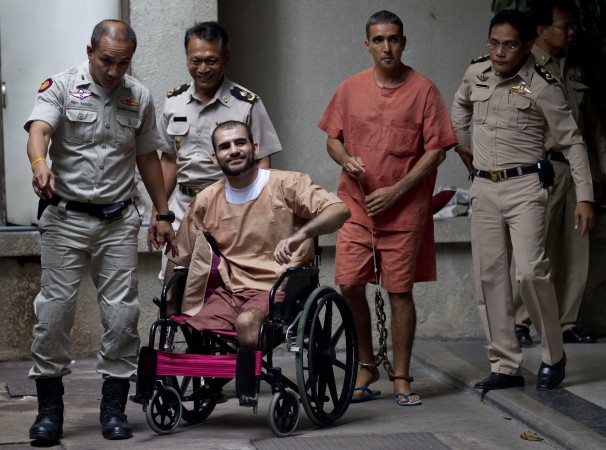UPDATES
New evidence of Iranian terror in Southeast Asia
August 30, 2013 | Sharyn Mittelman

The recent convictions of two Iranians – Saeid Moradi and Mohammad Kharzei – in a Bangkok court for a botched bomb attack last year, highlights the ongoing terrorist threats posed by Iran around the world, especially in our own region.
Three bombs went off in Bangkok on 14 February 2012, injuring five people. The first was apparently an accidental blast at a house that the two Iranians shared with an additional suspect. Another bomb was thrown at a taxi and a third blew off Moradi’s legs before he was arrested.
The court sentenced Moradi, 29, a factory technician and former soldier, to life in prison for attempting to murder a police officer and possessing explosives that damaged property and injured several civilians. His accomplice, Kharzei, 43, was sentenced to 15 years for possessing explosives. Another Iranian suspect – Masoud Sedaghatzadeh, 31, fled to Malaysia after the explosion, and is currently appealing an extradition order.
Despite the two not being convicted of terrorism charges, Israeli and Thai officials have said that they believe that they were planning a terrorist attack on Israeli diplomats in Bangkok.
There is compelling circumstantial evidence for this – the explosion happened one day after the wife of an Israeli diplomat was wounded in an attack on her car in India, which Israeli and Indian authorities believe Iran orchestrated. In addition, the suspects’ statements inadvertently point in that direction, as reported by the Washington Post:
“Moradi had said he was carrying the explosives out of the house in an attempt to dispose of them. He also said he was not aware that the explosives were similar to ‘sticky’ bombs used against Israeli diplomats in foiled attacks a day before the Bangkok incident in India and the former Soviet republic of Georgia. Investigators said the bombs found at the Bangkok home had round, coin-like magnets on them.
Kharzei has testified that he was not a terrorist and had nothing to do with the explosions. He says he had not known Moradi until they met at an airport in Tehran before boarding their flight to Thailand.”
Israeli Prime Minister Binyamin Netanyahu’s spokesman Mark Regev welcomed the convictions, saying:
“We have seen Iranian/Hezbollah terrorist operations in Asia, Africa, Europe, North America, in countries across the planet… This involvement can simply not be denied. The Iranians both directly conduct attacks, and — when it suits their interests — work through proxies like Hezbollah. I would hope that today’s convictions in Bangkok will serve as a wake up call to those in eh [sic] international community who have illusions about Iranian behavior.”
Israel’s Foreign Ministry also welcomed the verdict:
“This bomb plot was part of an ongoing Iranian terror campaign that targets Israeli and Western objectives… This is evidenced, among other things, by the use of identical explosives in the near simultaneous attacks which were carried out by Iranian terrorists in Bangkok, New Delhi and Tbilisi. In the latter two cases, it should be remembered that the perpetrators managed to affix magnetic explosives to Israeli diplomatic vehicles.”
Adding that Israel “calls on the international community to continue to fight terrorism with determination, in accordance with the legal tools at its disposal, and to bring to justice those involved in such activities.”
Meanwhile, the Israeli Government’s Counter-Terrorism Bureau issued a frightening travel warning, listing dozens of countries where it said it had “concrete” indications of a terrorist threat planned to coincide with the forthcoming Jewish festivals that take place in September, as well as the September 11 anniversary – which is a “favored period” for al-Qaeda and other Islamist terrorist groups. It also warned that Iran and Hezbollah, were continuing their “global terror campaign” against Israeli and Jewish targets.
Sharyn Mittelman





